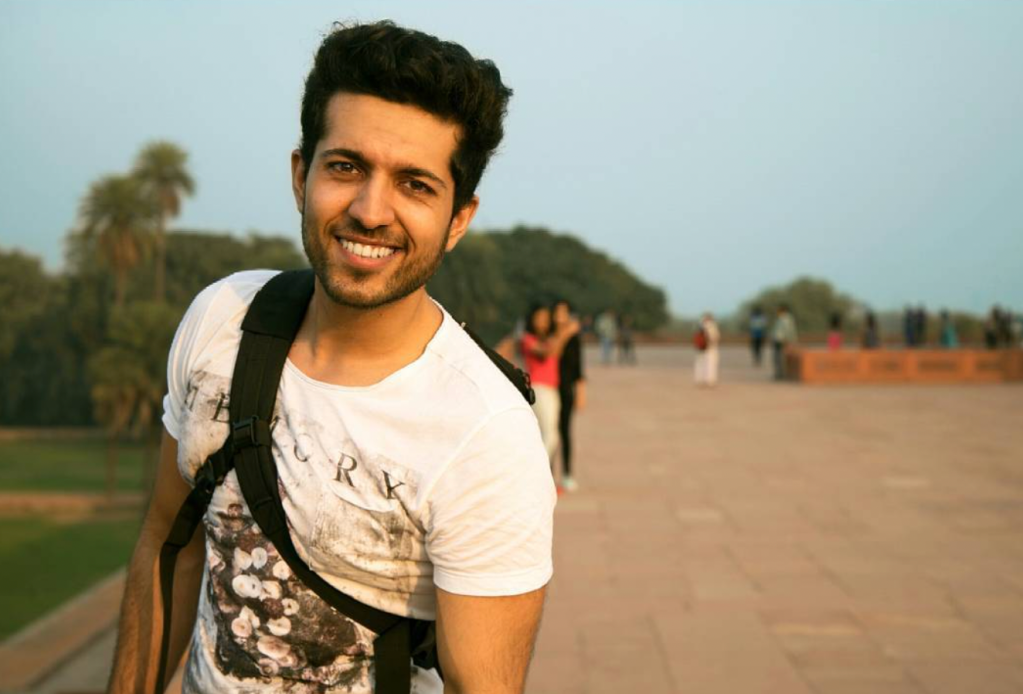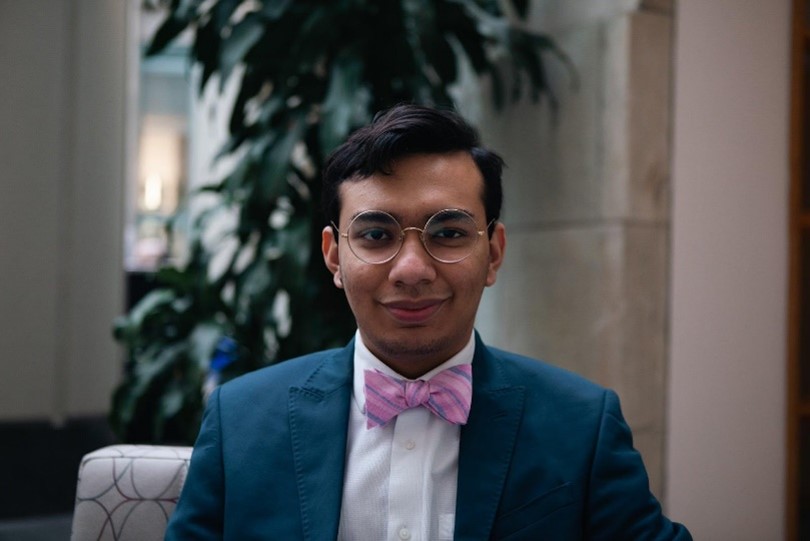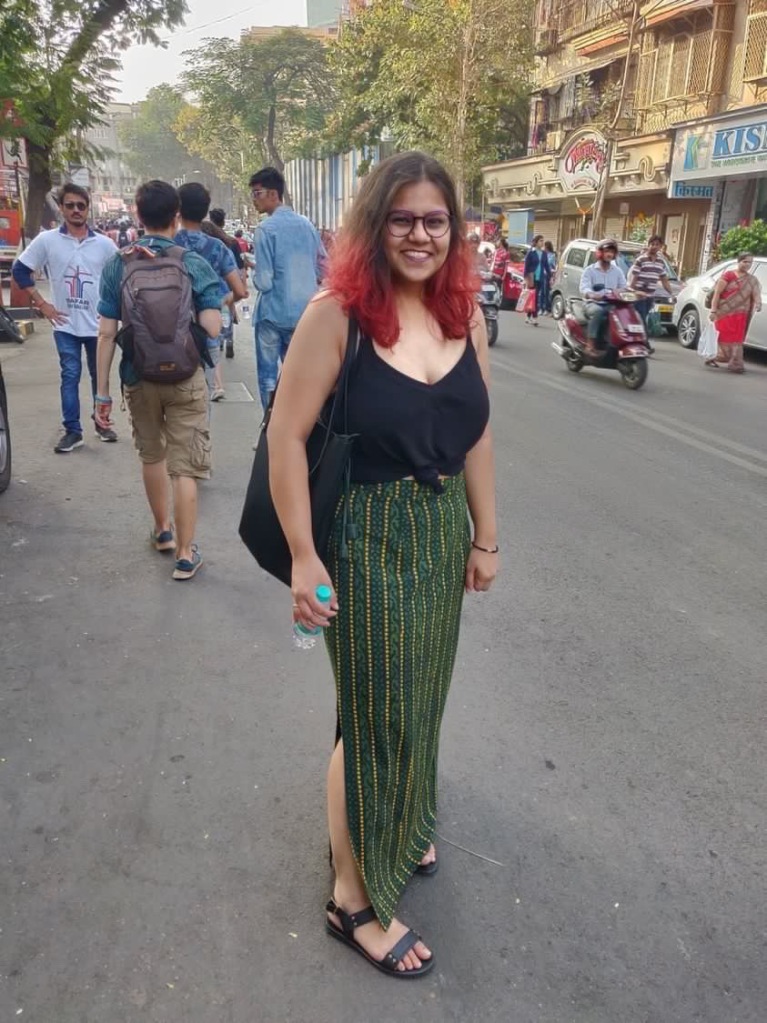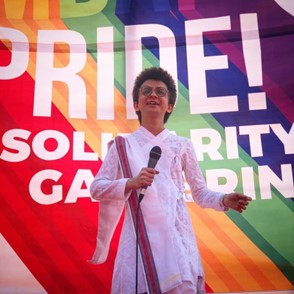Saattvic is one of the many Indian gay men who moved to Vancouver in 2020 searching for a more inclusive and equal society.
Born into a relatively open-minded family in Mumbai, he planned on marrying his long-term partner, something that is still considered illegal in modern-day India.
He said if gay marriages were legal in India, Saattvic, who uses one name, “would never have left (and) would probably have been married already in India” with his partner.
The economist turned PhD student at the University of British Columbia is among the 52 petitioners demanding marriage equality for queer couples in the Indian Supreme Court.
Currently, same-sex and queer marriages in India are not considered legal under the Indian Constitution, and marriages are defined as “a contract between man and woman united together to support each other in a shared household.”
Article 14 of the Indian Constitution provides “Equality of Law” to all its citizens without discrimination based on religion, race, caste, sex or place of birth.
However, homosexuality was decriminalized in 2018 with the abolishment of the constitution’s Article 377, which outlawed consensual gay sex.
A 2023 survey released by Pew Research Center indicated 53 per cent of Indians are in favour of same-sex marriages in the country, while 43 per cent oppose it. And in a Pew survey released in 2020, 37 per cent of respondents said that “homosexuality should be accepted by society,” twice the acceptance rate of 15 per cent in 2014.

Saattvic moved to Vancouver from India in 2020 due to the denial of equal rights for the LGBT community.
The Supreme Court’s five-judge panel heard arguments made by lawyers of 52 petitioners and the Indian government, beginning on April 18, 2023.
Rohin Bhatt, an openly queer lawyer, who drafted two of the 20 petitions submitted to the court, told the panel of judges headed by Chief Justice D.Y. Chandrachud that his position is based on four questions:
-> Do the members of the queer community have a fundamental right to marriage?
-> If the court finds there is a right to marry, can the Supreme Court declare that there is a right?
-> Are LGBTQ+ included under the Special Marriage Act, and is their right to recognition and registration of marriages considered valid discrimination under Article 14 of the Constitution of India?
-> And are LGBTQ+ included in the Hindu Marriage Act, and is their right to recognition and registration of marriages considered valid discrimination under Article 14 of the Constitution of India?
Bhatt said the court chose to leave arguments about religious acts out of this hearing and “has chosen to only look at the petitions under the Special Marriage Act.”
According to the Indian judiciary, all marriages come under the Hindu Marriage Act of 1965, the Muslim Marriage Act, of 1954, or the Special Marriage Act, of 1954.
While the first two are based on religious rituals, the Special Marriage Act of 1945 offers a unique type of marriage for those who don’t want to follow the standard religious rituals. It permits a legal civil marriage ceremony regardless of the religion or faith practiced by the parties involved.
This act is different from the Hindu Marriage Act of 1955, which includes legislation applied to “persons that are Hindus, Buddhists, Jainas or Sikhs by religion.”
According to a journal article published by Duke University Press in 2010, about 78 per cent of the Indian population follow Hindu law. Hindus make up 78.9 per cent of the Indian population as of 2021.
Bhatt said the Special Marriage Act legislation uses “gender-neutral language,” so an argument was put forward to recognize queer marriages under this law.
“It can be between a cis man and a cis man, a cis man and a cis woman, a trans man and a trans woman,” he said. “All permutation and combinations that may be possible because the law says any two parties.”

Rohin Bhatt is a human rights lawyer at the Supreme Court of India who filed two of the 20 petitions.
Saattvic and three others filed a petition targeting the Special Marriages Act.
“We didn’t want to get into any religious debates,” Saattvic said.
Tushar Mehta, the Solicitor General of India, argued on April 27 against the petitioners highlighting that granting additional rights to queer marriages, which are not available to heterosexual couples under the Special Marriage Act, would be problematic.
Mehta cited a provision regarding divorce.
“This is a right specifically given to the wife. In case of a gay marriage who would get this right? The petitioners’ argument is that the court must allow both parties to have this right. But there is a problem there…can the court allow a right to one party in a gay marriage and not to a party in a heterosexual marriage?” he told the court.
Young queer Indians leaving India due to social exclusion
Saattvic said their petition “sort of represented people who had either already left the country or were in the process of trying to leave the country because equal rights are being denied to us in India.
“Most people that I know here (in Vancouver) who are gay and Indian, moved abroad because they were gay, not because of anything else,” he said.
Saattvic said their petition also highlighted the larger economic loss to the country from denying and not recognizing LGBTQ+ rights.
He said this was based on a study conducted by the World Bank which focused on the “costs of stigma and exclusion of LGBT people in India.”
The study conducted by M. V. Lee Badgett in October 2014 said “stigma and exclusion of LGBT people are likely to generate economic costs, particularly from lost productivity as a result of workplace discrimination, and health disparities (in HIV, depression, and suicidal ideation).”
The study also cited the economic costs of exclusion “can be reduced through effective efforts toward full social, economic, and political inclusion of LGBT people.”
Sunakshi Sethi, an Indian bisexual woman, said the principal reason she moved to Toronto is that she wouldn’t be able to marry a woman in India.
“We wouldn’t have to make such a drastic decision of moving to a different country,” she said. “We can live in that same country and still at least hope to get the same rights.”
She said if queer marriages are legalized in India, “it’s going to change the way we talk about our future to our parents and our family or how we’re even going to think about it personally.”
Sethi was in a live-in relationship with her former girlfriend, but the couple pretended to be “just friends” to avoid judgmental comments from their neighbours.
“People who are very backwards might not give you their house if you are actively looking for a house together as a couple” because they “don’t want someone from that community living” in their homes, she said.
Sethi said she feared violent reactions from neighbours and house owners if the couple’s sexual identity would be exposed.
“I’ve heard of instances where people, at least homosexual men, have lived together, but someone’s found out and then they’ve gotten into a physical altercation with them which is what I thought could have happened with us,” she said.
Sethi said queer couples face issues even if people saw them holding hands on the streets.
She said they would look at them “weird” or call them things.
Sethi said although she received support from her friends and her mother, she is still hesitant to come out to her father.
“I still think that’s something where India is evolving,” she said. “We’re not there yet.”

Sunakshi Sethi participated in the Mumbai Pride Parade in 2019.
Darshik Joshi, 27, a gay man born and raised in Mumbai moved to Toronto in 2018 seeking a more inclusive environment and a better life for himself.
Joshi said when he came out to his mother at the age of 20, he was shocked by her reaction.
“When I came out to her gay, she couldn’t understand it,” he said. “She thought that I’m trans.”
Joshi said when he first told his mother, she listened to him calmly.
However, he said, within a week she refused to support his sexuality when “she realized her opinion of what gay is does not matter because the family that she’s married into is way regressive as compared to the family she comes from.
“For her, it was choosing to stand up for her son or losing everything which she has worked on” since she married into a conservative Indian family where women were not even allowed to work after marriage, Joshi said.
Joshi said his father found out he was gay when he saw a picture of him participating in the Pride parade in Toronto. He said his father wanted him to move back to India under the threat of losing financial support from the family.
“I chose the latter option,” Joshi said. “For two years I did not have a conversation with my parents.”

Darshik Joshi faced trouble coming out gay to his parents, something that is still taboo in modern-day India.
He said, as an international student, being cut off from his parents was difficult for him financially so he worked multiple jobs and took a few loans to pay his bills.
“When COVID hit, in the peak of 2020, when India was really in a terrible situation, my parents called me to check on me,” Joshi said. “And then from there, we rebuilt our relationship.”
Since then Joshi and his parents have been working on their relationship.
“We have reached at a point where I can crack a subtle boy joke and my mom will not laugh, but she would not say anything in return,” he said.
Despite being on talking terms with his father, Joshi said he still hasn’t had an open conversation about him being gay.
Indian government opposes petitions
On April 17, the Indian government argued against the petitions in the Indian Supreme Court by submitting a written reply stating that same-sex marriage is based on “urban elitist views” and that gay marriages are not similar to the Indian family unit concept of a husband, a wife and children.
The Hindu nationalist government led by Prime Minister Narendra Modi said the definition of valid marriage could only be between a man and a woman. The government added any changes should be made by the parliament and not the courts because it “seriously affects the interests of every citizen.”
However, according to a Reuters report, Mohan Bhagwat, chief of the Rashtriya Swayamsewak Sangh (RSS), the Hindu-nationalist, right-wing parent organization of the ruling Bhartiya Janata Party (BJP), supports queer individuals and relationships on Jan. 11.
Bhagwat told an RSS-backed magazine, that the LGBTQ+ community “should have their own private and social space as they are humans and have the right to live as others.”
Ankit Bhuptani, the founder of Queer Hindu Alliance, a Hindu faith-based support group for queers and allies, said the Indian government’s response does not respect and recognize the diversity and equality promoted by all the major religions followed in India.
Bhuptani, a gay-rights activist since 2014, said he has seen and met hundreds of Indians from the LGBTQ+ community when he travelled to smaller cities throughout the country.
“And if nobody believes me, they can just go to any corner of the country, download Grindr (a dating app for queers), and they can find (members from the) community within the radius of one kilometre,” Bhuptani said.
“So, the community is not an urban elite concept,” he said.
Bhuptani, a proud gay man and a proud Hindu, said this court challenge has “pushed us to look towards LGBT rights, moving beyond what is acceptable in the norm of society or not.”
He said if the petition is accepted and turned into a law, marriage equality will enable more queer Indians to come out of the closet.
“It will give another push towards that process of people living their own truth,” Bhuptani said. “Because any legal change brings in the stamp of the authorities’ approval which really impacts the society.
He said when homosexuality was still a crime, the queer community was extorted in multiple ways.
“I’m talking about police brutality, blackmail of the community, and in which sometimes law enforcement agencies like police themselves being involved in it,” he said. That “has 99.99 per cent stopped now” since the law changed, Bhuptani said.
Bhuptani said the decriminalization of homosexuality helped many individuals come out and talk about their sexuality without any fear.
“I could have not talked about marriage equality in 2017 because I was still a criminal,” he said.
He said if marriage equality becomes a law, it’ll enable a greater social and familial acceptance for people from the LGBTQ+ community.
“I feel any legal change brings in the confidence of living your truth,” Bhuptani said.

Ankit Bhuptani is an LGBT rights activist who said the marriage equality law could bring societal and familial acceptance to the queer community in India.
Bhatt said people in India still follow the Supreme Court and its judgements because “the court has some moral authority that it derives from the Constitution.
“By and large, people still believe that courts are not compromised as of yet,” he said.
Bhatt said marriage equality will provide queer couples with more rights in Indian society.
“There’s around 8,200 of those rights which the petitioners have recognized and kind of put there,” he said.
Some of these rights include opening joint bank accounts, allowing one to nominate their partner for life insurance and giving the rights to an individual’s partner to make medical decisions when the other is incapacitated, Bhatt said.
Saattvic is hopeful that the Indian Supreme Court will rule in the petitioners’ favour.
He said while some make arguments about society not being ready, “the actual fact is that society takes its cues on what is moral or immoral many a times from the law.”
“In my view, the law being changed is the most important step towards societal acceptance,” he said.
The bench heard final arguments on May 12, following a 10-day marathon of hearings. The court reserved its final judgement and has not yet given a date for delivering its decision.
Taiwan is the only country in Asia that recognizes same-sex marriages and adoption by queer couples as legal.
“We’ve got precedent now from enough countries which allow gay people to get married, Saattvic said. “India doing it, I think, would be good because it would be like the first large developing country to do this.”
